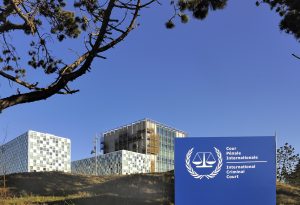Late last week, the Philippines’ government officially requested the International Criminal Court (ICC) to not resume its investigation into the violent anti-drug war launched by former President Rodrigo Duterte.
On September 8, the office of Solicitor General Menardo Guevarra said in a statement that it had transmitted the country’s official reply to the “alleged crimes against humanity” via the Philippine embassy to the Netherlands, as the Daily Tribune reported.
The statement from Guevarra’s office made a number of points. The first is that the ICC “has no jurisdiction over the situation in the Philippines.” The second is that “the alleged murder incidents that happened during the relevant period do not constitute ‘crimes against humanity,’ considering that said incidents do not qualify as an ‘attack’ against the civilian population.”
The third argument it made is that the complaints filed before the ICC “are already being investigated and prosecuted by the proper agencies” and that under the tribunal’s “complementarity principle,” in which the court only acts in cases where a nation is unwilling or unable to do so itself, there are no grounds for proceeding with a case.
“The Philippine government explained to the ICC Pre-Trial Chamber the extent of the drug problem in the Philippines and the process of investigating and prosecuting drug-related offenses under the Philippine legal and judicial system,” the statement added.
Duterte’s deadly “war on drugs,” which was modeled on the ruthless approach to illegal narcotics that he took as mayor of Davao City in the southern Philippines, began at almost the moment that Duterte was sworn into office in mid-2016. By the end of his six-year term, it had claimed unknown thousands of lives; some human rights groups put the death toll as high as 12,000.
In September of last year, judges at the ICC authorized an investigation into the Philippines’, describing it as a “widespread and systematic attack against the civilian population.” While Duterte responded to the possibility of an ICC investigation by withdrawing the Philippines from the Rome Statute, the treaty that governs the ICC, in 2019, court prosecutors claim that they have jurisdiction over crimes committed prior to that point.
In late 2020, former ICC chief prosecutor Fatou Bensouda announced that a preliminary probe had found “a reasonable basis to believe that the crime against humanity of murder has been committed on the territory of the Philippines” between July 1, 2016, when Duterte came to office, and the country’s withdrawal from the Rome Statute on March 16, 2019. In its announcement last September, the ICC also included in the scope of the investigation killings committed on Duterte’s watch in the area of Davao City prior to his taking national office in 2016.
Shortly before Marcos succeeded Duterte following his landslide election victory in May, the new ICC chief prosecutor Karim Khan requested the resumption of the court’s investigation into the anti-drug campaign. This had been paused since a deferral request from Manila the previous November, to allow it to make progress in its own investigations into cases of extrajudicial killings attributed to the police during anti-drug operations.
Of course, human rights groups claim that these investigations are threadbare and insufficient. The U.S.-based advocacy group Human Rights Watch said last week that it had “found no compelling evidence that the government was seriously investigating these cases, let alone prosecuting those responsible,” adding that“the killings are continuing and impunity for police officers and others implicated in these abuses by all accounts remains intact.”
At the start of August, barely a month after succeeding Duterte, Marcos said that the Philippines had “no intention” of rejoining the ICC or cooperating with an investigation. This latest announcement merely reinforces Manila’s message that prosecutors can expect no cooperation if they choose to proceed with its investigation. Even if they gather enough evidence to issue indictments, they will then face the challenge of securing the defendants, something that for nationalist reasons it is hard to imagine any Philippine government being willing to do – even if it is controlled by Duterte’s opponents.
































